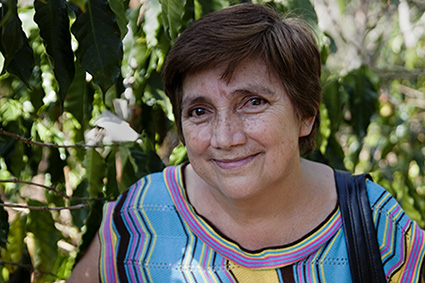Teresa Riviera Palacios has been the president of the co-operative Dantanli Los Robles since 2012, and has been farming coffee for many years.
About Teresa
Teresa’s co-operative is a member of UCA SOPPEXCCA, a union of 16 co-operatives with 510 coffee farmers, which provides a range of services to members and strengthens their position in the marketplace.

She has two sons and three grandchildren who help her on the farm and who she hopes will continue the tradition of being coffee farmers. In this interview she discusses the difference that becoming Fairtrade certified has made to her co-operative and the wider community, including:
- Social benefits such as education, gender equality and medical improvements
- Environmental benefits such as training programmes and increased awareness
- Financial benefits including higher profits enabling innovation.
Life before Fairtrade
“We are very grateful to you for talking to us and seeing the needs that we producers have, because before I was organised I used to sell my coffee in the market very cheaply and missed out on many benefits. I wasn’t prioritising my land or the environment and I was just selling for the sake of selling. Before, this farm used to be just grasslands for the horses, we didn’t have anything. Before, I only had three coffee plots, but now thanks to Fairtrade we have been able to purchase more land and plant seven new plots.
Once I became organised and joined the UCA SOPPEXCCA I really liked their work. I really respect Mrs Fatima [Ismael Espinoza, the General Manager], for her integrity – all of us producers are very fond of her for her reliability and transparency. Now we know who we are giving our product to. Without this integrity we wouldn’t sell our products through them.
Before we joined the co-operative we didn’t even know Fairtrade existed, we knew only about a kind of trade that didn’t offer any premiums, where traders used to keep the profits and leave us only with debts.”
How Fairtrade has benefited farmers and the community
SOPPEXCCA have supported women to market their own coffee under the Las Hermanas brand, which attracts an additional premium to use on gender empowerment activities. This was invested in a cervical cancer screening initiative that reached 15,000 women and an access to land programme.
Other projects by SOPPEXCCA include: improving community infrastructure such as road repairs, school construction and street lighting; school and university scholarships, improving food security through encouraging diversification into growing other crops such as fruit, and a youth programme to establish a chocolate enterprise for local markets.
“Now that we are organised we can see how Fairtrade has had an impact in all the lives of the small producers. It has benefited us in terms of obtaining loans and also through training programmes that we have received from technicians, so that we can improve the quality of our coffee and look after the environment. The environment is the lungs of the world; if we don’t look after it we can’t make plans for the future. ‘
The environment is the lungs of the world; if we don’t look after it we can’t make plans for the future.
Teresa Riviera Palacios
It has also impacted of the lives of many women who were on the verge of dying from cancer – they were saved thanks to the Fairtrade Premium. So it has actually prevented the death of many people who were suffering from cancer. So we are not just talking about financial benefits in our pockets but also about the impact in people’s lives that were saved thanks to the coffee beans. This small plant is saving lives thanks to Fairtrade.
We have also improved our environment. We learned to create natural barriers all around us thanks to the Fairtrade principles, including a ditch where many small animals live. Our land provides a habitat for many animals and we look after them.
We now teach our children about the environment and have improved their education; we offer scholarships and we can buy school materials.
The role of and respect for women has changed too. Women today are not like they were before; we are now part of organisations. Mrs Fatima and I are examples of this, and there are many others who also work in co-operatives. We have increased the value of women and their self-esteem, which was very low due to the macho culture inherited from our previous generations, and has been replaced by gender equality. The new-found mutual respect has meant that there is no family violence here in the co-operative – it has been eradicated.
So, again it’s not just a coffee bean, it is a vehicle for peace within our homes and education through the Fairtrade principles, so we really need to look at all the important benefits we’ve had from Fairtrade, mainly us producers.”
It’s not just a coffee bean, it is a vehicle for peace within our homes and education through the Fairtrade principles.
Teresa Riviera Palacios
Looking to the future
“I invite all the producers of the world to organise themselves into co-operatives and to look after the environment. Stop burning the forests, clearing the land and polluting the water and to stop using banned chemical products which are harmful to coffee consumers, animals, and the environment. Chemicals also kill the organisms in the soil and lead to erosion. We are responsible for the erosion of our soil – sometimes by thinking that we are improving and will produce more, over time we can end up not producing anything at all.
So if all the small producers organise themselves in co-operatives, we will really benefit and we will really value the world that our God has gifted us.”